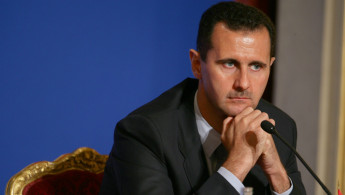EU extends Syria sanctions by a year for 'ongoing repression'
A meeting of the 28 EU foreign ministers in Brussels agreed to roll over sanctions against President Bashar al-Assad's regime until June 1, 2019 and also updated the bloc's list of individuals subject to travel bans and asset freezes.
A total of 259 people and 67 organisations are now under sanction by the EU.
"Given the ongoing repression of the civilian population, the EU decided to maintain its restrictive measures against the Syrian regime and its supporters, in line with the EU strategy on Syria," the European Council, which groups the member states, said in a statement.
EU sanctions currently in place against Syria include an oil embargo, restrictions on certain investments, a freeze of Syrian central bank assets held in the EU and restrictions on the export of equipment that might be used for repression.
The EU has been pushing for a resumption of UN-led peace talks in Geneva as a means to end the Syrian civil war, which has raged since 2011.
The sanctions came as a state-run newspaper said Damascus will fight rebels - or "terrorists" as the regime labels opposition fighters - in Daraa despite Washington's warning that it would take "firm and appropriate" measures against a new offensive in the province.
The editorial appeared in the Al-Baath daily and said the US threat underscores the "dirty American role in the terrorist war" against Syria.
A Russian-sponsored agreement last year established de-escalation zones under which Daraa falls. The agreement stipulated freezing lines of conflict in those areas.
However, regime forces dropped hundreds of leaflets on rebel-held Daraa, which is considered "the cradle of the Syrian revolution". The pamphlets warned of an imminent offensive and urged anti-Assad fighters to disarm.
On Wednesday, the Syrian Observatory for Human Rights reported that regime forces fresh from their victory against the Islamic State in Damascus began moving into the southwestern province.
Most observers say the regime is emboldened after securing a number of major military wins. It has recaptured all of Damascus and surrounding suburbs for the first time since the civil war began in 2011.
Rebels still control stretches of territory in Syria's northwest and southwest regions. Kurdish forces that are backed by the US hold the quarter of Syria east of the Euphrates River.





 Follow the Middle East's top stories in English at The New Arab on Google News
Follow the Middle East's top stories in English at The New Arab on Google News
![Israeli forces ordered bombed Gaza's Jabalia, ordering residents to leave [Getty]](/sites/default/files/styles/image_330x185/public/2176418030.jpeg?h=a5f2f23a&itok=_YGZaP1z)

